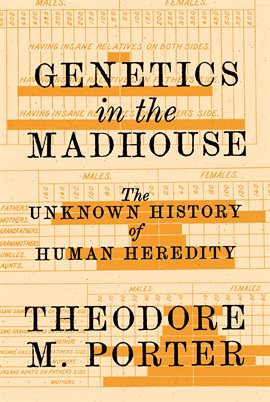
Title:
Genetics in the Madhouse
The Unknown History of Human Heredity
Author:
Porter, Theodore M.
Subject:
| Life Sciences |
| Genetics & Genomics |
| Psychology |
| Science |
| Mental Health |
| History |
| Modern |
Description:
"Winner of the Pfizer Award, History of Science Society" "Winner of the Cheiron Book Prize, Cheiron: The International Society for the History of Behavioral & Social Sciences" "One of Science News' Favorite Science Books of 2018" Theodore M. Porter is Distinguished Professor of History and holds the Peter Reill Chair at the University of California, Los Angeles. His books include Karl Pearson: The Scientific Life in a Statistical Age, Trust in Numbers: The Pursuit of Objectivity in Science and Public Life, and The Rise of Statistical Thinking, 1820–1900 (all Princeton). He lives in Altadena, California.
The untold story of how hereditary data in mental hospitals gave rise to the science of human heredity
In the early 1800s, a century before there was any concept of the gene, physicians in insane asylums began to record causes of madness in their admission books. Almost from the beginning, they pointed to heredity as the most important of these causes. As doctors and state officials steadily lost faith in the capacity of asylum care to stem the terrible increase of insanity, they began emphasizing the need to curb the reproduction of the insane. They became obsessed with identifying weak or tainted families and anticipating the outcomes of their marriages. Genetics in the Madhouse is the untold story of how the collection and sorting of hereditary data in mental hospitals, schools for "feebleminded" children, and prisons gave rise to a new science of human heredity.
In this compelling book, Theodore Porter draws on untapped archival evidence from across Europe and North America to bring to light the hidden history behind modern genetics. He looks at the institutional use of pedigree charts, censuses of mental illness, medical-social surveys, and other data techniques--innovative quantitative practices that were worked out in the madhouse long before the manipulation of DNA became possible in the lab. Porter argues that asylum doctors developed many of the ideologies and methods of what would come to be known as eugenics, and deepens our appreciation of the moral issues at stake in data work conducted on the border of subjectivity and science.
A bold rethinking of asylum work, Genetics in the Madhouse shows how heredity was a human science as well as a medical and biological one. "I suspect this bold, dauntingly well-documented book will prove difficult to dismiss."---David Dobbs, Nature "By following the technologies of paperwork and data collection, Porter has unearthed a radically new history of human genetics, one that evokes not the double helix but the humble filing cabinet."---Emily M. Kern, Science "Fascinating but scary. Genetics in the Madhouse . . . uses date collection in psychiatric hospitals to show the stages when research straddles subjectivity and science."---Liz Else and Simon Ings, New Scientist "Porter takes a fascinating look at early attempts to tame unruly minds with big data and statistics."---Bruce Bower, Science News "Deeply researched and deftly argued."---Gregory Radick, Times Literary Supplement "[An] absorbing account of the role played by mental illness studies in gaining an early understanding of human heredity."---Robin McKie, The Observer "Genetics in the Madhouse provides a fascinating examination of investigations of human heredity, conducted long before DNA could be studied in laboratories."---Glenn Altschuler, Philadelphia Inquirer "Genetics in the Madhouse has the power to inspire, to captivate and to stimulate further research."---Nicholas P. Hatton, Medical History "We've all been taught how genetics got its start in Mendel's pea patch. But the real story is more complicated, and a lot more interesting. In Genetics in the Madhouse, Theodore Porter chronicles some of the early history of heredity-not in gardens, but in asylums. The book is a fascinating exploration of the long-running conviction that madness, criminality, and other mental traits can be passed down from pa
Publisher:
Princeton University Press
Date:
2018-06-05
Digital Format:
HOOPLA E BOOK







